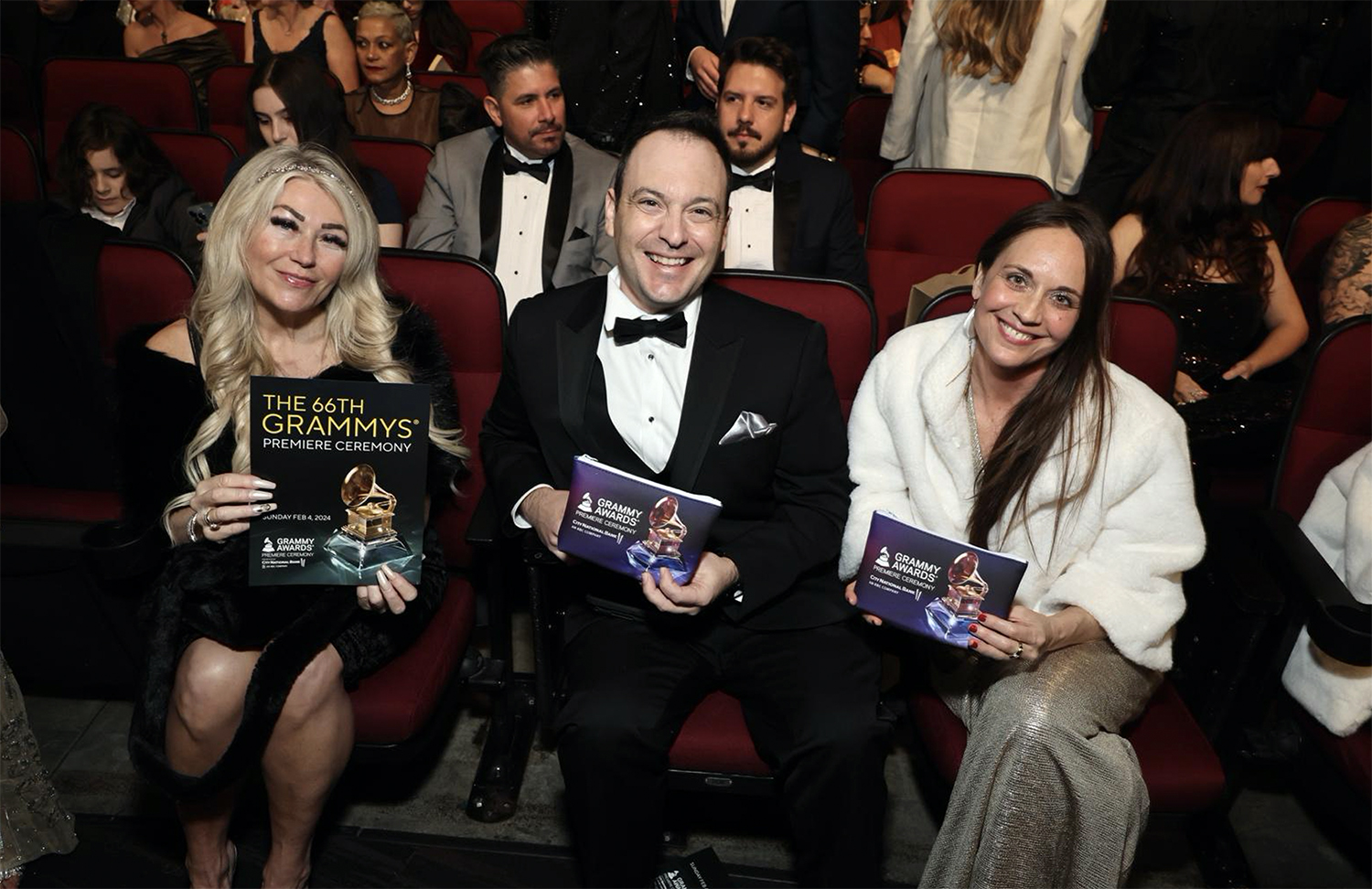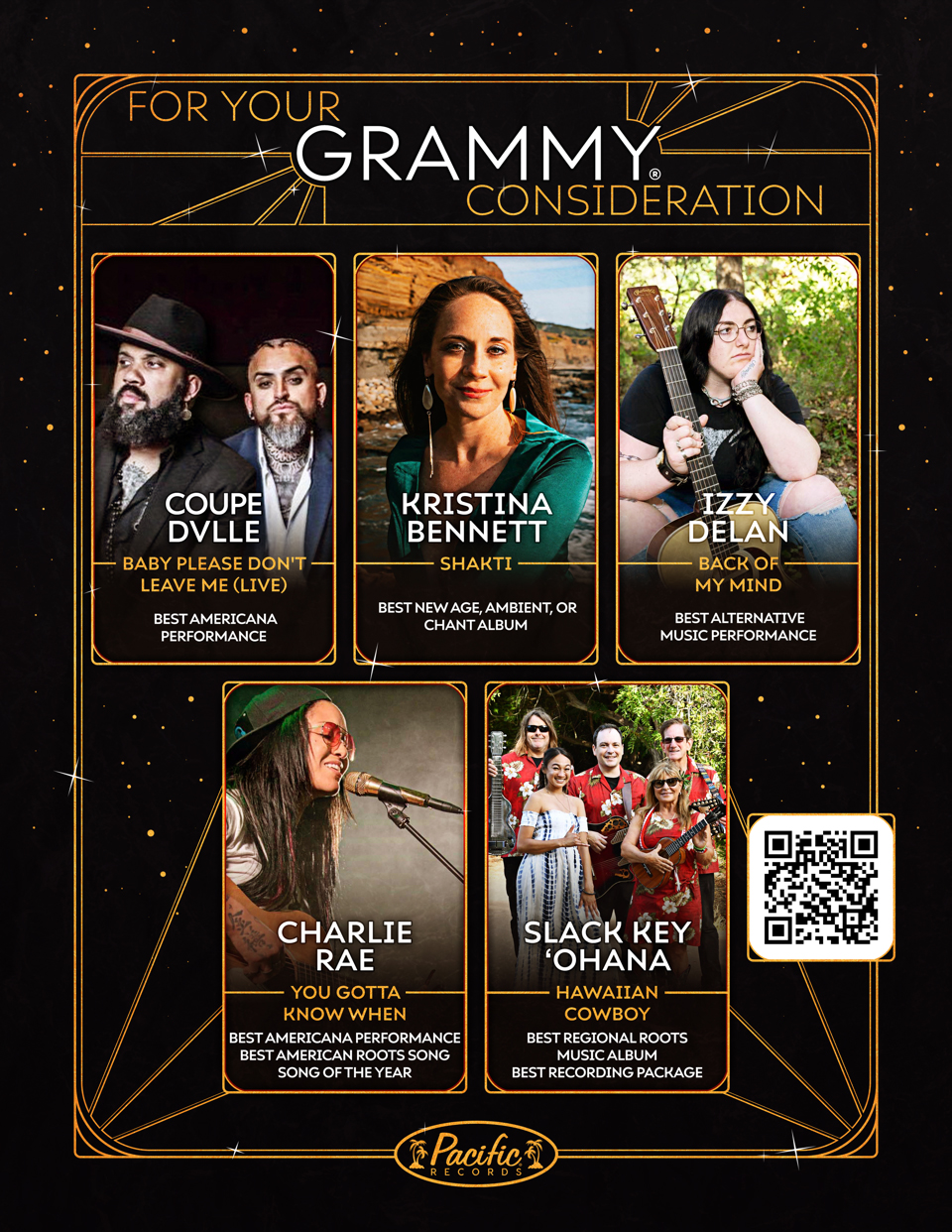It’s GRAMMY Season! A Behind-the-Scenes Look into the Awards Process by Brian A. Witkin, Esq.October 2024
An Interview with Attorney Haley McCullough from Metro-Goldwyn-Mayer Studios Inc by Brian WitkinMay 2022

Brian Witkin, Esq. at the 66th annual GRAMMY Awards, alongside fellow entertainment attorney Christine Busineslle, Esq. (Left) and Pacific Records Recording Artist Kristina Bennett (Right). Photo: Randy Shropshire
Awards season is in full swing and the 67th annual Grammy Awards will take place February 2, 2025, in Los Angeles. Widely known as “Music’s biggest night,” the Grammy Awards are the ultimate peer recognition for music creators. Merely a nomination, let alone a win can both have meaningful consequences for the careers of creators because of the credibility associated with the prestigious accolade.
Martin Guigui, a Grammy-nominated producer explains: “Being nominated to me feels like a WOW birthday gift, the coolest celebration of a collaborative vision, and a validation of the dedication to the craft and life you love.”
Ever wonder how your music can be considered for a Grammy? To answer this question, we must first look at the organization that puts on the awards show.
Who Runs the Grammys?
The organization behind the GrammyAwards is the Recording Academy (formerly known as the National Academy of Recording Arts and Sciences or NARAS). According to their website (www.recordingacademy.com), their mission is “to recognize excellence in the recording arts and sciences, cultivate the well-being of the music community, and ensure that music remains an indelible part of our culture.”
The recording academy membership is primarily made up of two classes:
Both categories have stringent requirements for membership and require two recommendations from industry peers to be submitted electronically to the academy before applications can be processed.
Qualification: Eligibility Period

A threshold requirement for any music submission is that the product is timely, meaning it was released during the period the awards show is recognizing music. For example, this year, to be eligible for entry to the awards show happening next February, a product must have been released between Sept. 16, 2023–Aug. 30, 2024. Assuming your submission falls into the eligibility period, the next step is to identify an appropriate award category and submit the work.
Product Submission
Once you meet the requirements and want to submit your product, there are two primary ways to submit: voting members and media companies (i.e., record labels and other companies that release music and videos). Media companies and voting members can submit the creative projects they have worked on directly to the Recording Academy. Once the submission period closes, the Recording Academy vets each entry to ensure that all the requirements are met. This year, the submission period was from July 17, 2024–Aug. 30, 2024. Typically, as long as your submission meets all the criteria it should make it on the first-round ballot for voting.
Solicitation Guidelines and FYC
The academy has strict rules and solicitation guidelines that expressly prohibit members from asking others to vote for their entries. Part of the reason the Grammy Award is so prestigious is because the Academy is so stringent on protecting the integrity of the nomination process. The term “For Your Consideration” or “FYC” is the phrase commonly used to share entries with other members asking them to “consider” their entries. The rules and guidelines can also be found on the academy website. During Grammy season, artists that submitted their work share and advertise their entries, including placing promotional FYC advertisements in publications like Billboard magazine.
First-Round Voting
This year first-round voting will take place between October 4th and October 15th to determine the nominees in each category. First-round voting compiles all the submissions that meet the eligibility criteria, placing them on an electronic ballot for eligible members to vote. This is the case for most Grammy categories, however, some craft categories are voted on by select committees in an effort to appropriately assess the criteria in these specialized categories. That process is outside the scope of this writing as this is meant to be a broad overview.
Final-Round Voting: And the Nominees are…
In general, the top five entries from first-round voting results in each category move on to become the official nominees. This year the nominees will be announced on November 8, 2024. Reaching the final round is an achievement in itself and carries great weight in the industry. Once the nominees are announced, voting members get to submit their votes in the final round between December 12th and January 3rd. The results of the final-round voting determine the award winners for the year.
Conclusion
Regardless of the outcome, the awards season is a great time to showcase your best work as a music creator and be seen and heard by your peers and the public. Good luck to all the entrants and be sure to tune in to the 67th Annual Grammy Awards on February 2nd to watch the Grammy performances, nominees, and winners!
Disclaimer: This writing is not affiliated, endorsed, or approved by the Recording Academy / Grammy Awards. Please visit grammy.com for complete and detailed information.
About Brian Witkin
Brian Witkin runs a boutique entertainment law firm in San Diego, California. He is also an award-winning musician, producer, and CEO of Pacific Records. Brian has spent nearly two decades in the record business, is a Grammy Voting Member of the Recording Academy, and official Ovation Guitars artist. Brian’s father, Joe Witkin, was the original keyboard player for Sha Na Na, who performed at the iconic Woodstock Festival in 1969.
Note: This article is for general informational purposes only and does not establish an attorney-client relationship. The information is deemed reliable but not guaranteed. Every situation is different, and the general information contained in this article may not apply to your specific situation. The author and publisher assume no responsibility for actions taken based upon the contents of this article. Seek the advice of counsel for your specific situation.
© Law Offices of Brian A. Witkin 2024.

